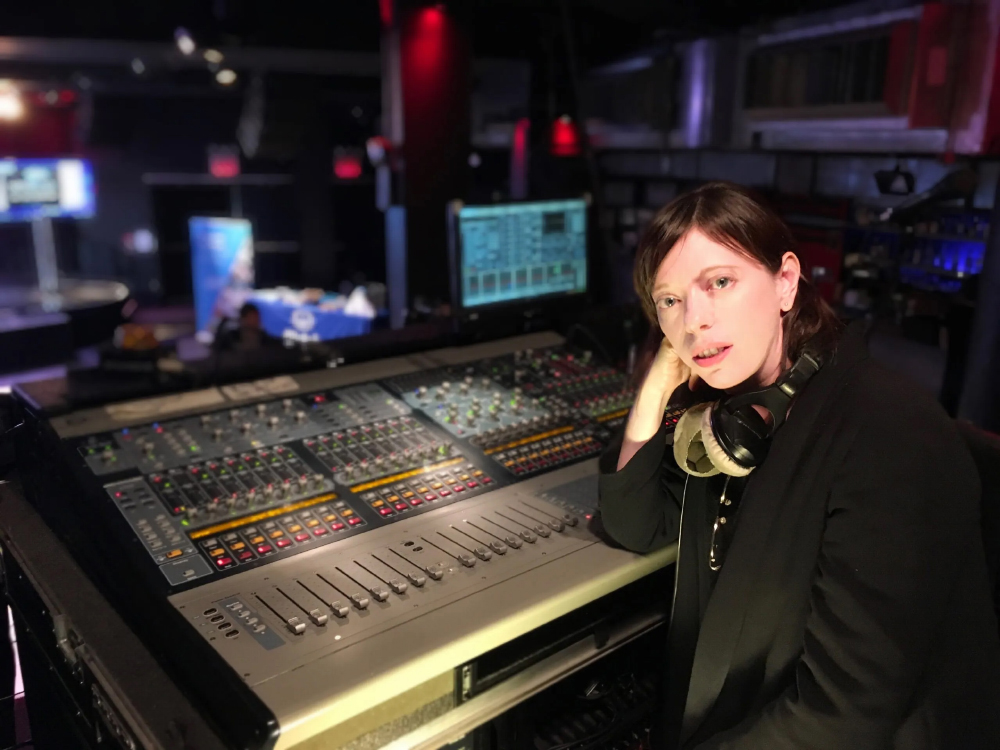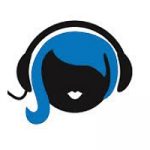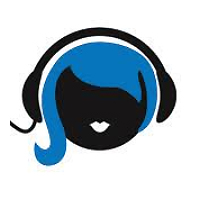Dana Wachs is a Brooklyn-based audio engineer, tour manager and composer/musician who started her career in music in 1994 as a bass player for the punk rock band Holy Rollers, which ignited her interest in live sound. After a national tour supporting punk rock band 7 Year Bitch, she made her first foray into the practice of professional audio at the Black Cat live music venue in Washington, DC followed by a move to the city’s 9:30 Club.
On her first national tour in 2002, she served as both tour manager and front of house engineer for Canadian musician Peaches supporting Queens of the Stone Age, and then hit the international trail with American singer-songwriter Cat Power. Since then – until the pandemic – she was on the road for up to 11 months a year, mainly as FOH engineer with artists such as MGMT, St. Vincent, M.I.A., Grizzly Bear, Foster the People, Nils Frahm, Deerhunter, Jon Hopkins, and many others.
When she’s not touring, Wachs composes and performs under the name Vorhees, with two releases on the Styles Upon Styles (Brooklyn) label. She’s also currently composing her first feature film score.
Early Interests
Wachs’ musical interest emerged early, learning to play cello at age nine and then moving on to electric bass a couple of years later when she was given an acoustic guitar. She’s mainly self-taught, and notes that learning to play a range of instruments helped her build a foundation for the basics of recording.
She was also exposed to a wide range of music growing up, as her father worked in radio and sent her the promotional Top 40 albums every month. “Top 40 was everything from new wave to new jack swing, so the sonic representation was quite broad for the mainstream,” she notes.
Her father also gave her a dual-cassette tape recorder and she’d spend her allowance on blank tapes, recording snippets of songs from the radio and her favorite recorded songs. It led to her seeking out a 4-track recorder and recording herself playing with the unit’s built-in microphone.
She received a partial scholarship to study theater at Adelphi University in New York but spent more time at the radio station. While there, she earned an FCC license while there (it used to be required even to be on college radio) and learned how to cue records, tapes. She also began an “unhealthy relationship” with collecting 7-inch records, she adds.
It was while touring as a 19-year-old bassist for the Holy Rollers on a five-week trip week, in support of 7 Year Bitch (7YB) that she got the “spark” that ignited a passion for working with live sound. “I would watch 7YB’s set from the sound booth, often focusing on their sound engineer, Lisa Fay,” Wachs explains. “I began to ask her standard newbie questions – ‘what does that button do?’ – and thankfully, she was not only patient but incredibly enthusiastic and encouraging. Her passion really excited me, and I realized the potential of engineering as a creative role, and not just purely technical.
“Audio was an obvious extension of my love for music,” she continues. “I considered audio as the representation of creativity in a tangible way, though of course, it can seem very abstract when first starting out. Playing instruments as a kid, as well as taking vocal lessons, impressed upon me the importance of really listening and not just hearing. That aspect of experiencing music, rather than passively enjoying it from afar, was a cathartic epiphany.”
The Path Forward
She embarked on her career path at the Black Cat in DC, working almost every service job possible – door person, barback, line chef – while seeing more legendary shows than she can list. One that made a major impact was Stereolab performing in support of their album Emperor Tomato Ketchup: “The FOH engineer had a bank of synthesizers that he’d play while he was mixing, and it suddenly clicked: that’s what I want to do! Eventually, I began to hang out at FOH on days off, and again would ask question after question (this time of Nick Pellicciotto, FOH for Fugazi and main house engineer at the) and was very graciously and patiently walked through signal chains, outboard gear, and so on.”
Eventually, she felt confident enough to offer her self-described “very amateurish skills” for free to regional bands. Without any formal education, she found that hands-on experience has been the best way to learn on the job.
Wachs moved back to New York in 1997 and began to intern at Greene Street Recordings, eventually assisting for the first time on a Pete Rock-produced track. Shortly after that, though, Pro Tools became “prosumer,” and she transitioned back to live sound as that’s where the work was, becoming the house engineer at Tonic on the Lower East Side, mixing legends like John Zorn, Marc Ribot, and other luminaries of the downtown/experimental scene.
She also notes the extremely important role that mentors can play in the lives and careers of aspiring production professionals. Besides the contributions of Lisa (Fay) and Nick (Pellicciotto) noted earlier, she notes that Queens of the Stone Age FOH engineer Hutch was also considerably helpful and welcoming.
“Because I’m self-taught, I’ve recognized that self-education is a discipline in and of itself,” she adds. “There are constant advances in the technology of the tools we use on the job, and without formal instruction, I can only rely on myself to seek out the education necessary to stay on top of the trade.”
Against that backdrop, let’s learn more with a Q&A session.

Q: What’s a typical day like for you on tour?
Wachs: Assuming I’m on a bus and also tour managing, I wake up in my bunk any time the bus parks, so I’m first up. Priorities are to send out the latest version of the day sheet to the touring party, get the bus driver checked into a hotel room ASAP, get day room keys for the crew/band, and shower/coffee before going to the venue.
I meet the production team during load-in and then act as the “catcher” as cases are brought into the venue. I drag/push/carry cases to their appropriate stage position as the backline tech sends gear in with local hands, and then, once the backline tech shows up, work with the venue’s FOH engineer to load my file and talk through the output patches, before moving back to the stage to place microphones. I’m super particular about most mic placements, so this gets checked and re-checked throughout sound check – hey, we’re all human and occasionally things get shifted between musicians and stage crew.
I don’t typically use pre-recorded music to tune a system if I’m in a small theater/large club situation. In higher capacity venues, I have playback and walk around all of the zones with a Lake EQ tablet, making slight adjustments as needed and letting the audio tech know if I hear any misalignments or time delay issues.
Then sound check, for as long as it takes. I mainly use sound check to make sure meters are reading healthy and lines are clean. I double-check all my effects and request the band finish the sound check with the first song of the set so we’re all pre-set for the opening of the show. Most larger rooms will sound very different once the audience covers the floors, dampening reflective surfaces, so I get my mix finalized during the first song and cruise from there.
Post-show, I immediately break down FOH as needed and collect microphones, paying special attention to odd/rare mic clips that sometimes are snatched with stands by local hands (even though everything I use is labeled). If the stage is crowded with our crew and local hands, I run and fetch the team water and beer (if it’s a casual, non-disco load-out), and then help direct the load-out under the guidance of the production manager/backline tech.
Every tour is different, so I find my place and routine within the crew during the first couple of days. Mainly, being present until the truck is loaded and/or the trailer is locked, is the goal. Then, if I’m also TM, it’s time to settle. I look over the contract at the top of the day and address any questions before doors. At the time of settlement, I hope to avoid an audit, but if expenses are not as detailed in the contract and advance, I take the time to collect receipts.
Time to get on the bus. If we’re crossing a border any time in the next 20 hours, I collect passports before we roll and leave them with the bus driver, as well as make sure they have the float they need and confirm the drive schedule. Finally, if everyone seems content, it’s time for a glass of wine as I confirm the day sheet for the next morning.
Q: How do you stay organized and focused?
Wachs: Any advance email has the date and venue in the subject line. If I get an email with several subjects in the body, I answer separate matters in separate emails, with appropriate subject lines. It’s the only way I can manage the thousands of emails that come through when tour managing.
I also use Google calendar to keep deadline notes with early notifications and have a simple shorthand system for noting when I have first addressed a need, received response, and accomplished the task. It makes it easier to search for unfinished tasks from my laptop or my phone.
Focus comes from not wanting to drop the ball, and while on tour, the momentum of the day (and coffee), keeps me moving. No matter how many moving parts there are at any given time, you can only manage one thing in that moment. I do my best to prioritize and then accomplish each goal in that order. Occasionally I remember to breathe.
Q: What do you enjoy most – and like least – about your job?
Wachs: I love mixing, hands down, the best. It’s more creative for me than technical, and my favorite shows I’ve mixed remain an indelible favorite memory, always. I also love international travel and cherish the few days off in new locales to explore and eat my way through the local culture. Also, I now have friends all over the world, and getting to see them as I tour is the best
On the downside, it’s never fun when the lighting person gets props from a drunk audience member for the show I just mixed. Also, the lack of privacy and personal space can be hard, as well as trying to maintain personal and familial relationships at home. True friends, of course, understand.

Q: What is your favorite activity on off days?
Wachs: Getting breakfast at the latest hour it’s served before hitting a museum (I prefer art and history museums), a botanical garden stroll, or having a swim, and then eating and drinking local specials. If we’re in a less specialized cuisine locale, then it’s sushi and sake, all day and every day. A movie is a great way to escape from tour life for a couple of hours, and a nightcap at the hotel bar is always welcome.
Q: What if any obstacles or barriers have you faced?
Wachs: Especially at the beginning of my career, gender discrimination was a common occurrence. It’s less common now, but unfortunately, still occurs, even recently being hit on by the house engineer during the show, which was distracting to say the least. I’m also self-taught and have been challenged in some of my processes (which at times tied into gender discrimination).
On my largest tour, there was a really awful audio tech. He’d sleep on the bus during sound check but chastise me if I insisted my desk be tipped exactly parallel to the stage. Every obstacle on the road is heightened by the intense physical and mental toll constant touring can strain an individual with, but at the end of the day, the job needs to get done.
Q: How have you dealt with these issues?
Wachs: I avoid confrontations as much as possible. That said, when I was younger, my emotions would lead my actions, with the perceived injustice of the situation fueling frustration. As I grew, I learned to save my emotions for when I had some privacy (a ladies room stall is generally a good spot to take a couple deep breaths). I’m more secure in myself and my skills by now, and if challenged in any way, I can calmly explain my position, firmly make the point that my position is well earned, while reminding any others that we are on the same team to make the show happen.
Q: Advice you have for other women and young women who wish to enter the field
Wachs: You really have to be passionate to withstand the rigors of touring, so make sure you love the work. Know your goals and maintain a skill set that will put you in the position you seek. Don’t let anyone talk down to you (they will try) and don’t be afraid to ask questions.
Q: Favorite gear?
Wachs: I’m well known for FOH effects manipulation, and I absolutely love all Eventide boxes to achieve unique sounds. I’ve used everything from the H9 stompbox to my vintage H3000 for most of the bands I travel with. Eventide reverbs are some of the most natural-sounding I’ve heard, though they can also provide the most mind-bending modulations, all with precise parameter control.
Q: What are your long-term goals?
Wachs: I’ve been on the road for almost 25 years now and don’t intend to ever “quit.” When I develop a real relationship with a band, it can be quite rewarding. However, now with all tours compromised by Coronavirus, I’m focusing more on my own music creation, as well as production/mixing jobs.
I’m also thankful to have been hired to score my first feature film, and I’ll also be recording a new album, and… well… we’ll see what happens.
Go here to find out more about SoundGirls.















